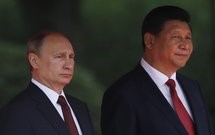 On Wednesday, Russian President Vladimir Putin concluded a successful trip to China that was marked by a range of major bilateral agreements. The most important was a long-awaited natural gas deal between Russian state-owned energy firm Gazprom and China National Petroleum Corp. But the significance of Putin's trip goes far beyond energy. The deal, along with the others reached, highlights a major shift in Sino-Russian relations that has widespread geopolitical implications.
On Wednesday, Russian President Vladimir Putin concluded a successful trip to China that was marked by a range of major bilateral agreements. The most important was a long-awaited natural gas deal between Russian state-owned energy firm Gazprom and China National Petroleum Corp. But the significance of Putin's trip goes far beyond energy. The deal, along with the others reached, highlights a major shift in Sino-Russian relations that has widespread geopolitical implications.
With Russia set to export some $400 billion worth of natural gas to China over the next 30 years, or approximately 38 billion cubic meter annually at $350 per thousand cubic meters, the deal is a good fit for both sides. China's energy demands are rapidly escalating, while Russia is looking to further diversify its energy exports away from Europe. Moscow has been particularly eager to complete the deal with Beijing, since it will give it considerable leverage in its bitter, protracted energy talks with Europe and Ukraine. To sweeten the deal, Moscow proposed several changes to its energy tax and export structures and offered China a large stake in Gazprom's liquefied natural gas project at Vladivostok. (China had already been awarded a stake in the Yamal LNG project run by Novatek, which is partly owned by Gazprom.)
The other agreements struck during Putin's two-day visit are unique in that they involve Chinese investments, infrastructure and businesses inside Russia. Moscow has long shied away from allowing heavy Chinese investment in its strategic projects; it feared that it would not have sufficient leverage over Chinese activities in Russia, as Moscow has had with the Europeans. For example, most Asian investors were not given a chance to bid on the Kremlin's modernization and privatization programs between 2008 and 2010.
The new deals include a $10 billion aviation agreement, a $2.6 billion power grid agreement, plans to build auto manufacturing plants and housing, and increased rail connectivity. Each of these would take place in Russia. Moreover, the largest proposal on the table would give China National Petroleum Corp. a 19 percent stake in Russian oil behemoth Rosneft, giving China a seat on the board of Moscow's most prized company.
Over the past decade, Russia and China have worked well together, especially on minor economic deals. Beijing and Moscow have found common political ground, aligning constantly against Western (particularly U.S.) interests by, for example, voting in tandem at the U.N. Security Council on issues involving Iran and Syria. But the current deepening of Sino-Russian economic relations is unprecedented.
This does not portend a return to the Sino-Soviet axis against the West of the 1950s. China is far too intertwined with the U.S. and European economies to attempt a grand realignment, and regional frictions, particularly in Central Asia and the Pacific, would further complicate such an alliance. Nonetheless, tighter bilateral relations would give Russia and China a stake in each other's futures. With significant investments in Russia, Beijing would have no desire to see an unstable Russia, and vice versa.
China now has sufficient interest in cooperating with Russia to avoid conflicts -- whether direct or in their overlapping spheres -- that could detract from Beijing's ability to manage attempts at containment by the United States and its allies. Russia is one of the few powers capable of significantly resisting or interfering with major U.S. foreign policy initiatives. Beijing's willingness to enhance its strategic relationship with Moscow reflects its belief that the United States poses a far greater threat to Chinese interests than does Russia. Similarly, giving another power a stake in Russian stability will help Moscow deter U.S. attempts to isolate or destabilize the country, particularly as tensions with the West continue to escalate.
Courtesy : Stratfor (www.stratfor.com)